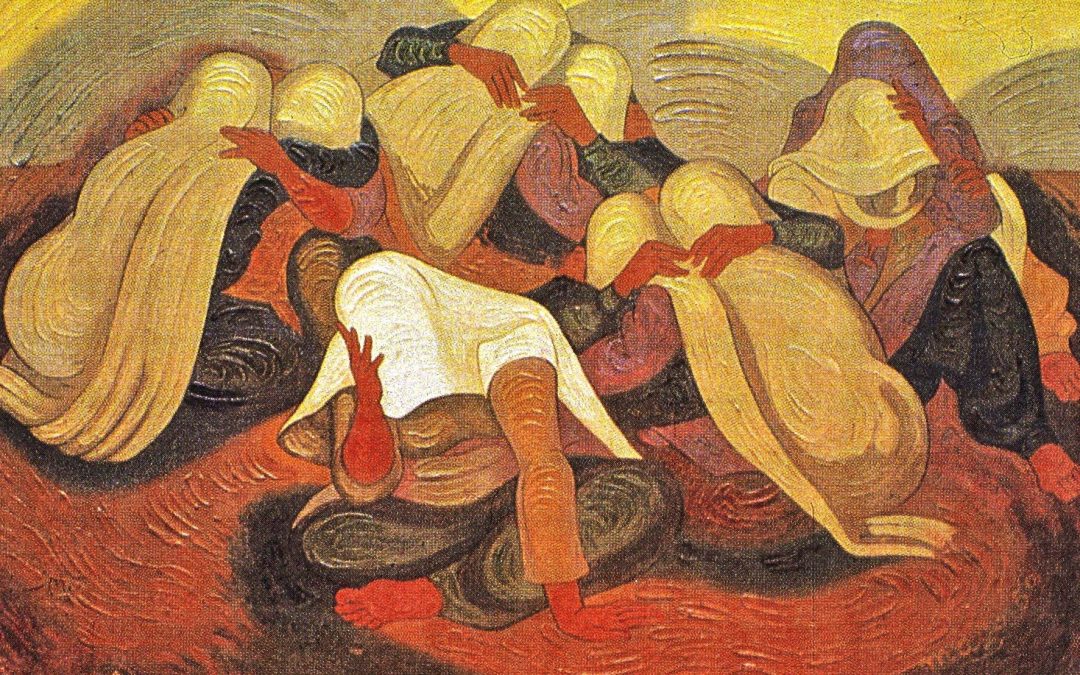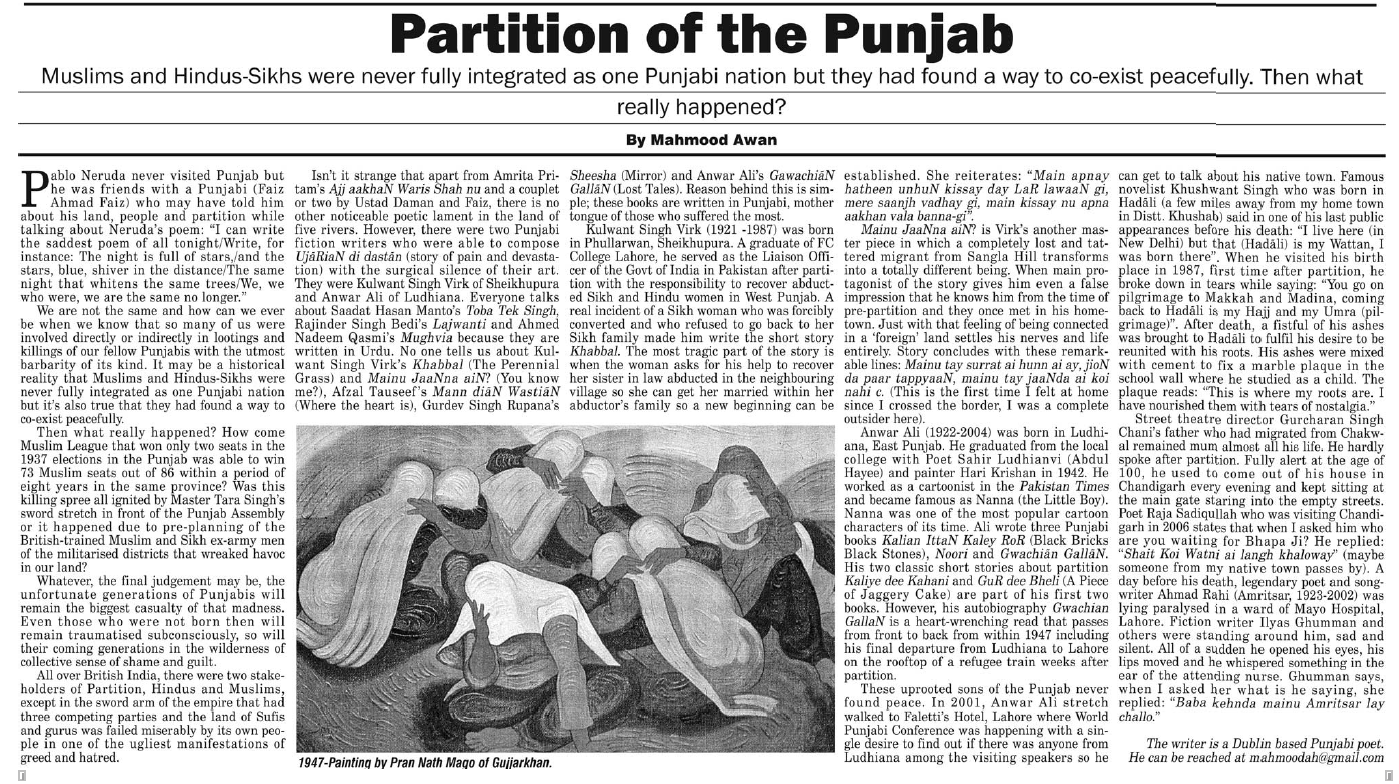Mahmood Awan (The News on Sunday, 16th August 2015)
Pablo Neruda never visited Punjab but he was friends with a Punjabi (Faiz Ahmad Faiz) who may have told him about his land, people and partition while talking about Neruda’s poem: “I can write the saddest poem of all tonight/Write, for instance: The night is full of stars,/and the stars, blue, shiver in the distance/The same night that whitens the same trees/We, we who were, we are the same no longer.”
We are not the same and how can we ever be when we know that so many of us were involved directly or indirectly in lootings and killings of our fellow Punjabis with the utmost barbarity of its kind. It may be a historical reality that Muslims and Hindus-Sikhs were never fully integrated as one Punjabi nation but it’s also true that they had found a way to co-exist peacefully.
Then what really happened? How come Muslim League that won only two seats in the 1937 elections in the Punjab was able to win 73 Muslim seats out of 86 within a period of eight years in the same province? Was this killing spree all ignited by Master Tara Singh’s sword stretch in front of the Punjab Assembly or it happened due to pre-planning of the British-trained Muslim and Sikh ex-army men of the militarised districts that wreaked havoc in our land?
Whatever, the final judgement may be, the unfortunate generations of Punjabis will remain the biggest casualty of that madness. Even those who were not born then will remain traumatised subconsciously, so will their coming generations in the wilderness of collective sense of shame and guilt.
All over British India, there were two stakeholders of Partition, Hindus and Muslims, except in the sword arm of the empire that had three competing parties and the land of Sufis and gurus was failed miserably by its own people in one of the ugliest manifestations of greed and hatred.
Isn’t it strange that apart from Amrita Pritam’s Ajj aakhaN Waris Shah nu and a couplet or two by Ustad Daman and Faiz, there is no other noticeable poetic lament in the land of five rivers. However, there were two Punjabi fiction writers who were able to compose UjãRiaN di dastãn (story of pain and devastation) with the surgical silence of their art. They were Kulwant Singh Virk of Sheikhupura and Anwar Ali of Ludhiana. Everyone talks about Saadat Hasan Manto’s Toba Tek Singh, Rajinder Singh Bedi’s Lajwanti and Ahmed Nadeem Qasmi’s Mughvia because they are written in Urdu. No one tells us about Kulwant Singh Virk’s Khabbal (The Perennial Grass) and Mainu JaaNna aiN? (You know me?), Afzal Tauseef’s Mann diãN WastiãN (Where the heart is), Gurdev Singh Rupana’s Sheesha (Mirror) and Anwar Ali’s GawachiãN GallãN (Lost Tales). Reason behind this is simple; these books are written in Punjabi, mother tongue of those who suffered the most.
Kulwant Singh Virk (1921 -1987) was born in Phullarwan, Sheikhupura. A graduate of FC College Lahore, he served as the Liaison Officer of the Govt of India in Pakistan after partition with the responsibility to recover abducted Sikh and Hindu women in West Punjab. A real incident of a Sikh woman who was forcibly converted and who refused to go back to her Sikh family made him write the short story Khabbal. The most tragic part of the story is when the woman asks for his help to recover her sister in law abducted in the neighbouring village so she can get her married within her abductor’s family so a new beginning can be established. She reiterates: “Main apnay hatheen unhuN kissay day LaR lawaaN gi, mere saanjh vadhay gi, main kissay nu apna aakhan vala banna-gi”.
Mainu JaaNna aiN? is Virk’s another master piece in which a completely lost and tattered migrant from Sangla Hill transforms into a totally different being. When main protagonist of the story gives him even a false impression that he knows him from the time of pre-partition and they once met in his hometown. Just with that feeling of being connected in a ‘foreign’ land settles his nerves and life entirely. Story concludes with these remarkable lines: Mainu tay surrat ai hunn ai ay, jioN da paar tappyaaN, mainu tay jaaNda ai koi nahi c. (This is the first time I felt at home since I crossed the border, I was a complete outsider here).
Anwar Ali (1922-2004) was born in Ludhiana, East Punjab. He graduated from the local college with Poet Sahir Ludhianvi (Abdul Hayee) and painter Hari Krishan in 1942. He worked as a cartoonist in the Pakistan Times and became famous as Nanna (the Little Boy). Nanna was one of the most popular cartoon characters of its time. Ali wrote three Punjabi books Kalian IttaN Kaley RoR (Black Bricks Black Stones), Noori and Gwachiãn GallãN. His two classic short stories about partition Kaliye dee Kahani and GuR dee Bheli (A Piece of Jaggery Cake) are part of his first two books. However, his autobiography Gwachian GallaN is a heart-wrenching read that passes from front to back from within 1947 including his final departure from Ludhiana to Lahore on the rooftop of a refugee train weeks after partition.
These uprooted sons of the Punjab never found peace. In 2001, Anwar Ali stretch walked to Faletti’s Hotel, Lahore where World Punjabi Conference was happening with a single desire to find out if there was anyone from Ludhiana among the visiting speakers so he can get to talk about his native town. Famous novelist Khushwant Singh who was born in Hadãli (a few miles away from my home town in Distt. Khushab) said in one of his last public appearances before his death: “I live here (in New Delhi) but that (Hadãli) is my Wattan, I was born there”. When he visited his birth place in 1987, first time after partition, he broke down in tears while saying: “You go on pilgrimage to Makkah and Madina, coming back to Hadãli is my Hajj and my Umra (pilgrimage)”. After death, a fistful of his ashes was brought to Hadãli to fulfil his desire to be reunited with his roots. His ashes were mixed with cement to fix a marble plaque in the school wall where he studied as a child. The plaque reads: “This is where my roots are. I have nourished them with tears of nostalgia.”
Street theatre director Gurcharan Singh Chani’s father who had migrated from Chakwal remained mum almost all his life. He hardly spoke after partition. Fully alert at the age of 100, he used to come out of his house in Chandigarh every evening and kept sitting at the main gate staring into the empty streets. Poet Raja Sadiqullah who was visiting Chandigarh in 2006 states that when I asked him who are you waiting for Bhapa Ji? He replied: “Shait Koi Watni ai langh khaloway” (maybe someone from my native town passes by). A day before his death, legendary poet and songwriter Ahmad Rahi (Amritsar, 1923-2002) was lying paralysed in a ward of Mayo Hospital, Lahore. Fiction writer Ilyas Ghumman and others were standing around him, sad and silent. All of a sudden he opened his eyes, his lips moved and he whispered something in the ear of the attending nurse. Ghumman says, when I asked her what is he saying, she replied: “Baba kehnda mainu Amritsar lay challo.”
Published on 16th August 2015 in The News on Sunday.
https://www.thenews.com.pk/tns/detail/559206-partition-of-the-punjab


